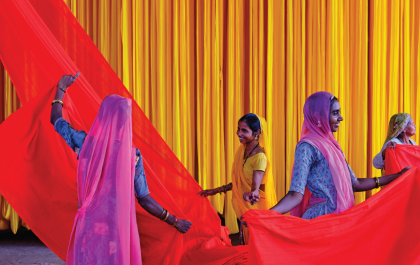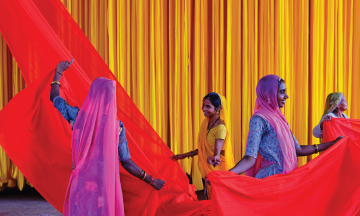A preview of the first Bangladeshi venture to make it to the Hulu platform
By Sadia Khalid Reeti
If there ever was a Bangladeshi director obsessed with a singular genre, compounded with the good fortune to get to make content of the said genre multiple times each year, it would be the unstoppable Nuhash Humayun, and the genre – horror, spliced with a tinge or a whole lot of comedy.
On the heels of the jaw-dropping success of Moshari qualifying for the Oscars, the young director scored yet another enviable gig, the first Hulu original from Bangladesh, Foreigners Only. It belongs to the Halloween anthology Bite Sized Halloween that features half hour short episodes from all over the world. The series, which released its third season on October 5, 2022, has a 6.5 overall rating on IMDb as of now. Foreigners Only has an episode rating of 7.4, which is higher than any episode from the first two seasons.
Although Moshari is now available for public consumption on Vimeo, Hulu is not available in Bangladesh (by subscription or otherwise). Yours truly got the private screening link from the director himself, and can now walk readers through the spoiler-strewn commentary while Hulu works on making its streaming service available to us, the foreigners.
The official summary of the episode reads: “Denied of an apartment reserved for ‘foreigners only,’ a desperate Bangladeshi tannery-worker will do whatever it takes to have skin in the game” on Vimeo and “In Bangladesh, a tannery worker searches for an apartment but the local landlords want ‘foreigners only’” on IMDb.
Nuhash is right on the money from the opening scene, juxtaposing animal skin hanging from a tannery ceiling with an advert of “Fairosol,” a fairness cream. As we’re not used to watching Bangladeshi English language content, the forced accents beg the question of whether it was the characters’ natural diction or a demonstration of the actors’ discomfort.

There is a cohesive design in Nuhash’s world, down to details such as how the title appears from a signboard. The production design incorporates just enough artificiality for viewers to excuse its occasional deviations from Dhaka reality, making the world look less chaotic and all-round “cool,” a brand that attracts young audiences, both South Asian and North American, like a moth to a flame.
Symbolic shots hide in plain sight, only to announce their existence upon second viewing. When tannery manager Hasan (Mostafa Monwar) stares at a sign on a residence entrance that reads “Foreigners Only,” the camera hangs around just long enough for us to notice a chalk scribbling of “Why” underneath that washes away in the rain, allowing the thought to form and float away like the futile protest of a writing that was doomed to perish.
Frustrated at not finding a suitable apartment that rents to locals, Hasan asks a landlord (Iresh Zaker): “What does a foreigner have that I don’t have?” The landlord replies: “Class, humility, they keep the apartment clean, they pay on time,” followed by an unlikely slander: “Foreigners are gentlemen, you are an animal.” Exaggerations such as this appear as attempts at coaxing sympathy out of the viewers.
While the central conflict of this episode is a worthwhile subject to explore, it feels imposed for someone like Hasan, who would have a much harsher brush with the “We don’t rent out to bachelors” stigma than this racist practice, which mostly applies to certain furnished flats of high-end neighborhoods that the apartments shown here do not resemble.
Hasan is trying to impress his superficial vegan girlfriend by getting this upscale flat. Unlike her, who for some unfathomable reason dates this diseased man reeking of dead animals, Hasan’s skin condition is rooted in an unfortunate reality, cleverly woven into the narrative. It reflects the fates of countless tannery workers who develop skin and respiratory diseases due to prolonged exposure to hazardous chemicals.

The “Stand Behind Line” sign at the pharmacy justifies why we’re witnessing the unnatural phenomenon of Bengalis quietly queuing up for anything. For the sake of believability, a “Keep Quiet” sign would be called for had it not been set in Nuhash’s alternate universe of horror/fantasy.
The film still tugs at our suspension of disbelief when Hasan magically appears from the dark alley to behind the foreigner in a speed fit for a supernatural entity, which he isn’t. However, this shot is a joy to decipher. The manner in which his partially visible dark face slides sideways behind this white man, aligns the heads like the fairness cream ads, one of which glows right above them. It’s a visual connection many will be able to make without any on-the-nose dialogue.
“Foreigners Only” leaves room for audiences to yearn for developing empathy for Hasan. When he scratches his itch uncontrollably and approaches the white man, we’re really not afraid of him or for anyone. It’s one of those instances where the short nearly crosses over to comedy territory, which is fine, as that’s a border not well-protected in this world of increasingly overlapping genres, and horror/comedy is an overarching theme of the writer/director’s origin story.
This is certainly not the first time we’re seeing a villain wear human skin as a mask. Leatherface from the Texas Chainsaw Massacre franchise wore the same, inspired by real life serial killer Ed Gein. But the message here is a new one for the screen, and it’s loud and clear. This tale of colonial hangover still seeping into every chasm of our society is a worthy one for a global platform like Hulu.
Just as Moshari portrays mosquito-ridden Third World countries as the proud survivors of a vampire apocalypse, this short also exudes positivity in the form of Hasan’s relentless pursuit to rent a “Foreigners Only” flat, even if that results in an act categorically gruesome.
Film critic/screenwriter Sadia Khalid Reeti is a Golden Globes voter (2023), Berlinale Talents alumna (2020), and Fipresci jury for Cannes Film Festival (2019)













